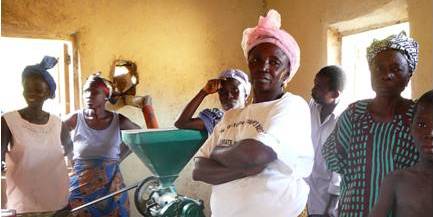
March 8, 2013, by ICCSR
Women’s Empowerment & CSR
“We want to see women in front of other women, talking to them”: Women’s Empowerment & CSR
Four International Women’s Days’ ago, I was sitting in front of the KTWN women’s network committee; women who were forthright in their demands to be on an equal footing with the men in their community. We were in a dusty room in Kailahun, Eastern Sierra Leone, and I was there to collect their stories and evaluate what effects NGO intervention had had on their lives. The women were farmers, working on land owned by their fathers or husbands, usually only with help from children kept back from school. Support, from NGOs, but also increasingly from the private sector, included donated rice milling machines that helped cut down on time spent pounding corn, and enabled children to go back to school, or women to attend training or meetings.
This training included book-keeping, which allowed women to keep an eye on accounts, and to begin to save to build their own meeting house. There more women could come to learn English, (the ‘official’ language of Sierra Leone) and literacy, so that they could write their own proposals. Previously they would have had to pay a man to do this for them. Diversification of income (and income that was their own) was especially important to the KTWN, so projects also helped launch micro-businesses such as soap-making or tailoring, or introduced a range of crops into the farm to boost sales & ensure protection from market fluctuations.
Why have I written about this experience on a CSR blog? For one, these women are contributing to a global economy in an understated, but thoroughly important way. They grow food for their local communities; up to 80% of food worldwide is provided by female farmers. Some of these women also contribute to commercial supply chains, growing the cocoa in our chocolate, the coffee in our cups, the flowers in your Mother’s Day bouquet. But as in the case of the KTWN, they own little of the fruits of their labour, working hard, long days without seeing much benefit.
Second, CSR has long discussed workers’ rights, and human rights. Here we have workers far removed from the easy-reach of multinationals, who nonetheless deserve our attention. Slowly, surely, companies are beginning to consider who is actually toiling in the fields and factories of the global supply chain. This is aided by NGOs provoking change through a carrot (see the UN’s Women’s Empowerment Principles) and stick method, notably the recently released ‘Behind the Brands’ report, which names and shames food companies under-serving the women in their supply chain. Understanding the nuanced experiences of women such as those in the KTWN (such as the fact they don’t own their own land, so often cannot join fairtrade co-ops) is often a first step in addressing ingrained inequalities.
It is not easy to include women like those I met in Sierra Leone in CSR matrices or measurements; they often contribute to food chains without contracts or rights. Innovative, forward-thinking approaches are needed by companies in order to reach, aid and harness the expertise and effort of those women.
By Lauren McCarthy, Graduate Teaching Assistant & Doctoral Researcher at the ICCSR.
Image: Women in Ngiema with their Rice Milling Machine, by Lauren McCarthy & Benny Littlejohn
Gender and CSR is the theme of the ICCSR Symposium to be held in Nottingham on 20th June 2013. Full details: http://www.nottingham.ac.uk/business/ICCSR/events.php?e=107
No comments yet, fill out a comment to be the first

Leave a Reply